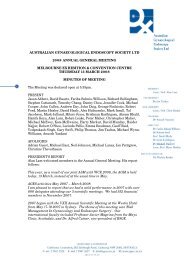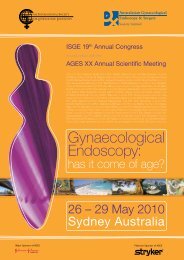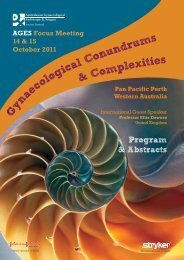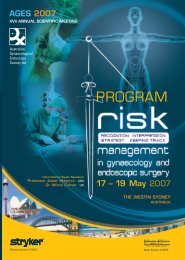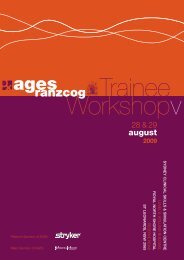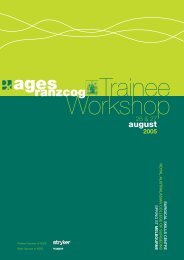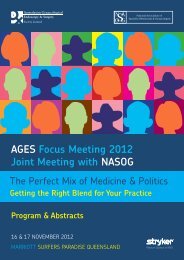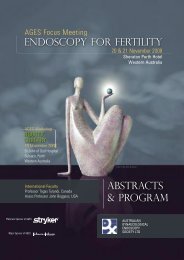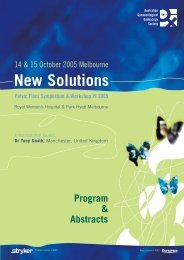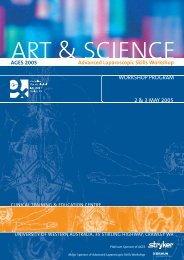AGES XXIII Annual Scientific Meeting 2013 Abstracts & Program
AGES XXIII Annual Scientific Meeting 2013 Abstracts & Program
AGES XXIII Annual Scientific Meeting 2013 Abstracts & Program
You also want an ePaper? Increase the reach of your titles
YUMPU automatically turns print PDFs into web optimized ePapers that Google loves.
The Pelvis in Pain<br />
Endometriosis and Beyond<br />
Free Communications Chairmen’s Choice - Friday 8 March<br />
SESSION 7 - Free COMMUNICATIONS<br />
Chairmen’s Choice / 1300-1310<br />
The use of a multimedia module to aid the informed<br />
consent process for gynaecological laparoscopy<br />
for pelvic pain. A randomised control trial<br />
Ellett L, Villegas R, Jagasia N, Beischer A, Readman<br />
E, Maher P<br />
Patients should be actively involved in decision making<br />
about their health care. Information is a key issue and<br />
communication difficulties have been linked to both patient<br />
anxiety and medico-legal sequelae. Multimedia modules<br />
claim to improve the informed consent process by holding<br />
a patient’s interest longer and aiding their understanding.<br />
Our group was involved in the development of a 15 minute<br />
multimedia module which explains the indications, benefits<br />
and complications associated with operative laparoscopy.<br />
OBJECTIVE: To examine whether watching a multimedia<br />
module will improve patient understanding about their<br />
operation and what role this might play on patient anxiety<br />
levels.<br />
DESIGN: Randomised control trial (Canadian task Force I)<br />
in a tertiary public gynaecology unit and Epworth private<br />
hospital.<br />
METHODS: 48 patients booked for operative laparoscopy<br />
for pelvic pain were approached. 41 agreed to participate. All<br />
patients had routine informed consent with their surgeon, who<br />
was blinded to the group the patient was assigned. The patients<br />
were then randomized to watch the multimedia module<br />
(intervention group) or not (control group). All patients<br />
then completed a knowledge questionnaire, the Spielberger<br />
short form STAI (state trait anxiety inventory). 6 weeks after<br />
recruitment patients completed the knowledge questionnaire<br />
again to look at retention of the information and the STAI.<br />
RESULTS: The intervention group had improved knowledge<br />
scores. Mean score in the control arm 7.9 (SD 2.63) vs 11.3<br />
(SD 1.79) p



